A magical and wonderful thing has happened to some customers who have Charter Internet service After restarting their cable modems for some reason or another, they found that their home internet connections had received a speed boost. It was a big one, boosting real-life speeds from about 30 mbps to 100 mbps. [More]
broadband

FCC May Redefine “High Speed” Internet To Mean Actual High Speeds
When we say “broadband internet,” we think that means “fast connections.” But as far as the actual regulations are concerned, that’s not necessarily true. To the FCC, “broadband” means anything with download speeds higher than 3 Mbps. Sure, that’s literally a hundred times faster than a 1993 dial-up connection — but as we move more and more into an all-online, all-streaming future, it’s just not enough. And so the FCC is considering changing the definition to match reality. [More]

Letting Sprint Buy T-Mobile Will Fix Broadband Competition, According To Sprint Chairman
Yesterday at the Code Conference, Sprint chairman Masayoshi Son spoke about the (terrible, horrible, no-good, very bad) state of internet service in the United States. But there was a distinctly self-serving undercurrent to Son’s speech. [More]

Verizon FiOS Gets Benefits Of Being A Public Utility Without The Regulations
As you probably know, Verizon was the company behind the lawsuit that gutted the FCC’s net neutrality rules. The telecom titan successfully argued that the FCC lacked the authority to regulate broadband providers like Verizon FiOS. What was lost in this discussion is the fact that all the while Verizon was saying FiOS should not face the same level of regulation placed on landline phone service, it was enjoying all the perks of being associated with a public utility. [More]
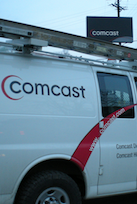
Comcast VP Predicts Company Will Implement Broadband Data Caps Within Five Years
Most of us like to dictate when and how often we use the internet, but one media company is now considering placing limitations on that use. Any guesses on just who that company is? Sure, that was an easy one: Comcast. [More]

Why Starting A Competitor To Comcast Is Basically Impossible
The mega-rich can dabble in pretty much any business they want to. Warren Buffet owns everything from furniture stores to ice cream chains. Richard Branson started a commercial spaceflight company, for crying out loud. And yet with demand for high-speed, affordable internet access going only up, up, and up, no new business or venture capitalist seems to be stepping into the fray to provide it. People passionately hate their current cable companies — so what’s stopping an enterprising entrepreneur from making a giant wad of cash entering the telecom game? [More]
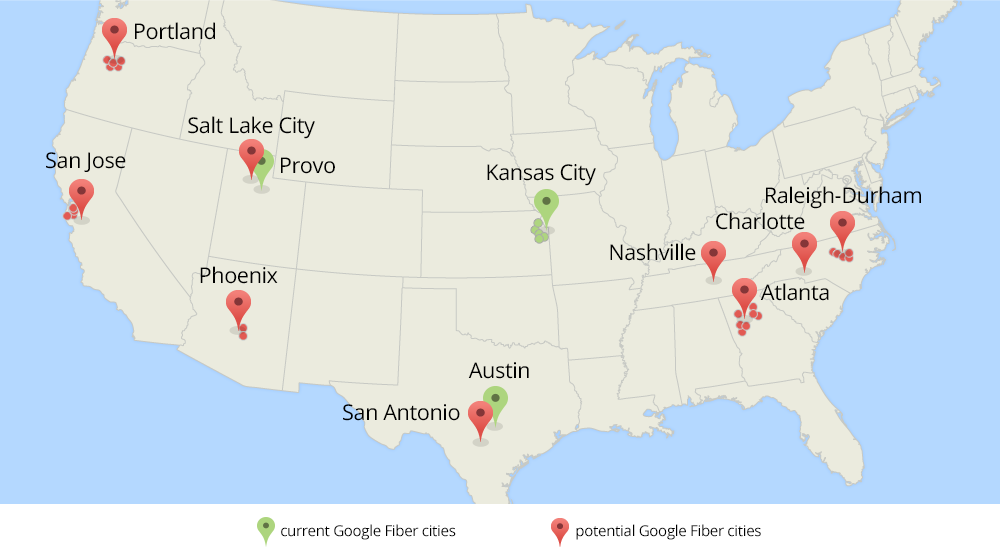
All 34 Cities Eligible For Google Fiber Expansion Get Applications In On Time
Earlier this year, Google announced that it was looking to expand its Google Fiber gigabit Internet service to up to nine new regional markets, encompassing upwards of 34 different cities. But in order for a location to be considered, they had to first fill out an extensive survey providing all sorts of details about their preparedness for a new service. Surprisingly, every single city under consideration got their homework done and returned to Google on time. [More]

AT&T Joins Forces With Honeywell To Announce New Inflight Internet Service To Rival Gogo
While Gogo Inc. is currently sitting quite pretty with about 80% of all wired commercial aircraft in the United States using its cellular network-based technology to keep passengers on the Internet while in flight. But there’s a new kid on the block ready to shake things up, in the form of an AT&T and Honeywell joint effort. [More]
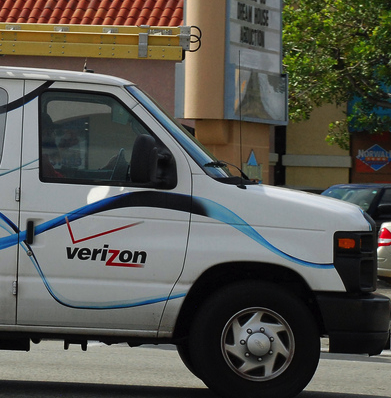
New Jersey Thinks 4G And Wired Broadband Are The Same, Lets Verizon Off The Hook
Someone at Verizon is wearing a party hat and celebrating this week, as the telecom titan convinced the state of New Jersey to let it wriggle out of a decades-old obligation to provide broadband throughout the entire Garden State, because apparently 4G wireless broadband is the same as a to-the-home wired connection, and broadband competition is completely unnecessary. [More]
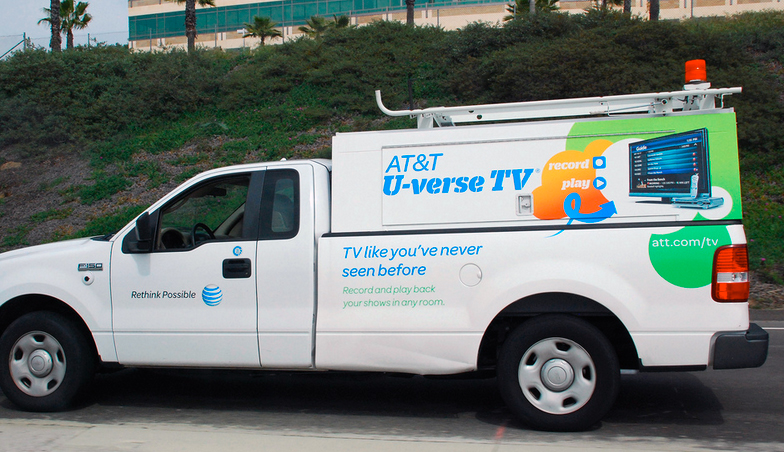
Spooked By Specter Of Competition, AT&T Considering Gigabit Fiber Expansion In 25 Cities
In a move that could theoretically bring something like the actual first glimmering hint of real broadband competition to a couple million more consumers nationwide, AT&T today announced major plans for expansion to their “GigaPower” Uverse service. The expansion could potentially bring the gigabit fiber broadband network to as many as 25 major metropolitan areas. [More]
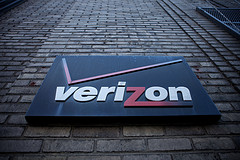
Verizon Brings Fake Grassroots Campaign To New Jersey To Claim Support For Not Bringing Real Broadband
New Jersey might not be that large a state, but its geography and its dense population make it easy to understand how running a broadband connection to 100% of residents could be a cumbersome and expensive project. So what’s a corporation stuck with a twenty-year-old public interest obligation to provide those broadband connections to do? Create a fake tidal wave of public support for their attempt to weasel out of it, of course! [More]

The Comcast Merger Isn’t About Lines on a Map; It’s About Controlling the Delivery of Information
Comcast and proposed merger partner Time Warner Cable claim they don’t compete because their service areas don’t overlap. They say that a combined company would happily divest itself of a few million customers to keeps its pay-TV market share below 30%, allowing other companies that don’t currently compete with Comcast to keep not competing with Comcast.
This narrow, shortsighted view fails to take into account the full breadth of what’s involved in this merger — broadcast TV, cable TV, network technology, in-home technology, access to the Internet, and much more. In addition to asking whether or not regulators should permit Comcast to add 10-12 million customers, there is a more important question at the core of this deal: Should Comcast be allowed to control both what content you consume and how you get to consume it? [More]

Comcast Officially Files for TWC Merger, Claims Broadband Competition Is Fine Because You Have A Smartphone
It’s a big day for Comcast: not only did they win a big old golden poo this morning, but also they formally took the first step in the regulatory dance that stands between them and their purchase of Time Warner Cable by filing a mountain of paperwork with the FCC. The massive document contains all of Comcast’s explanations for why the merger is the best idea ever… and it’s a doozy. Let’s take a closer look at their arguments, shall we? [More]
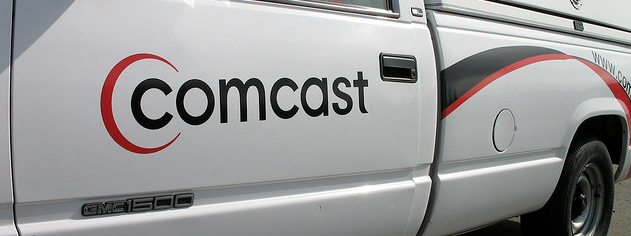
How Comcast Uses Low-Income Families To Look Good For Regulators
Back in 2011, Comcast launched a program to help low-income families. The program, Comcast Internet Essentials, lets certain families enroll in 5 MBps broadband for $10 a month. In timing that was completely coincidental we’re sure, shortly after announcing their plan to buy Time Warner Cable, Comcast announced an indefinite extension to the program. [More]
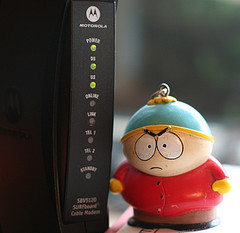
It’s Not Just You: Pretty Much Everyone Hates Their TV & Internet Providers, Survey Finds
If you’ve got problems with the company providing your TV and broadband service, you are most definitely not alone. Our siblings over at Consumer Reports ran a national survey to find out how satisfied with their cable and internet providers subscribers really are. And the findings won’t surprise most Consumerist readers: when it comes to their telecom providers, most consumers are a lot less than pleased. [More]
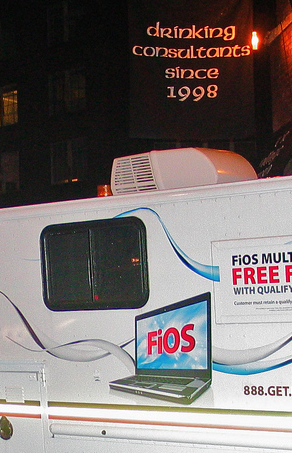
Don’t Count On Verizon FiOS Coming To Your Town Anytime Soon
While supporters of the Comcast and Time Warner Cable merger have pointed to the existence of competing Verizon FiOS service in certain markets as proof that there is indeed competition for broadband service (which there isn’t), the fact is that this fiber service isn’t going to be popping up in new markets in the foreseeable future. [More]
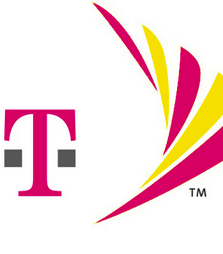
Sprint Owner May Push T-Mobile Merger As Broadband Competition Solution
Since taking a controlling ownership in Sprint, Japanese telecom company SoftBank has made no attempt to hide the lust it has in its heart for fellow wireless company T-Mobile USA. Since then, federal regulators have basically told SoftBank to put its ardor on ice because there is already too little competition in the wireless market. But SoftBank may have a trick up its sleeve, coming at the deal through the lens of a market that is even less competitive — broadband. [More]
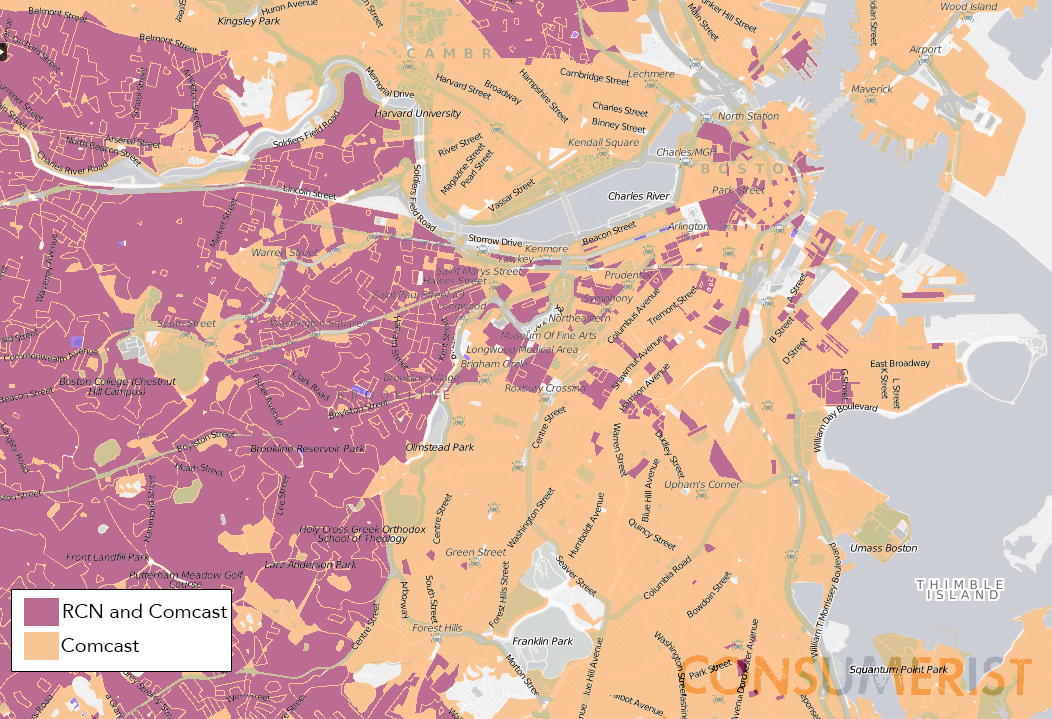
Here’s What the Lack of Broadband Competition Looks Like on a Map
When announcing Comcast’s intention to buy Time Warner Cable, Comcast CEO Brian Roberts called cable a “highly competitive and dynamic marketplace.” Dynamic it might be, but competitive it isn’t. Most of us live a local monopoly, cable-wise: it might be a Comcast city or a Time Warner town, but we don’t have that much choice with our providers. And those companies also, hugely, provide our broadband access. So what does 75% reach or a 15% market share really look like, to a city and the people in it? [More]


